We dive into the research investigating the question: Does Going Gluten Free During Pregnancy Reduce Baby’s Celiac Disease Risk?
Maybe you heard it from a friend, an aunt, or even your lovely neighbour that going gluten free has done wonders for their health. From weight loss to skin care, many people have claimed that cutting gluten out of their lives have solved all of their life problems. While I can’t confirm some of these miraculous successes, I do know that for many people (1 in 100 to be exact) suffering from celiac disease, cutting gluten out of their diet has significantly improved their health.
First of all, what is gluten? May sound like a no brainer, but for some, it’s not a clear answer. This was evident in the viral Jimmy Kimmel video here.
Gluten is a protein found in grains such as wheat, rye and barley – so a “gluten free diet” means completely cutting out foods that contain these ingredients like breads, pastas, crackers and so on. You know we’ve discussed this at length in our posts here.
What is Celiac Disease?
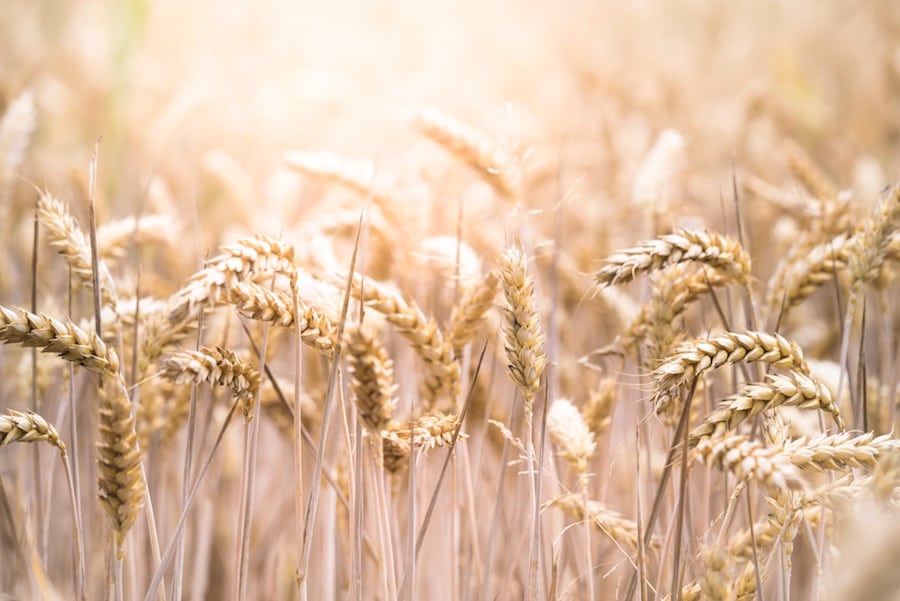
Basically, with celiac disease, the immune system attacks its own small intestine after eating gluten. The small intestine is an area of major nutrient absorption – so as you can guess, when it becomes damaged, nutrients don’t absorb as well. Over time this can lead to malnutrition and is linked to a whole basket case of other health problems – from Type 1 diabetes to infertility to decreased bone density. Some serious stuff!
What about gluten-sensitivity? Is it real?
On the other hand, there are individuals who do not have celiac disease per se, but report indigestion, bloating and cramping after eating gluten. Though there is simply not enough research to establish gluten sensitivity as a widespread medical condition (read a previous post on this here), what is true is that there’s a growing amount of people who simply choose not to eat gluten and report feeling much better. As there are new studies emerging on this topic every day (who knows what we may uncover about gluten-sensitivity?), we’ll have to hang tight and see.
Now that we have some background information covered – let’s jump into the meaty part of today’s post: does a gluten free pregnancy reduce your baby’s risk of developing celiac disease?
Does Going Gluten Free During Pregnancy Reduce Baby’s Celiac Disease Risk?
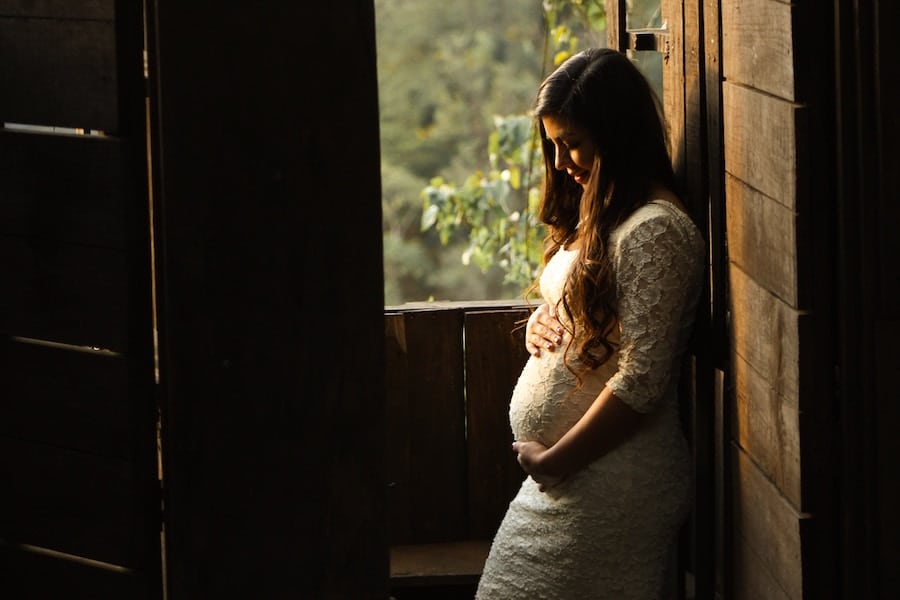
With the complexity of our digestive system and the controversy around “to be or not to be gluten free”, it was only a matter of time before researchers started focusing on a new target population: pregnant women. This raises the million-dollar question: Does Going Gluten Free During Pregnancy Reduce Baby’s Celiac Disease Risk?
Well, a few months ago, researchers in Denmark got a bit of media attention by studying mice to see if a gluten free pregnancy would lower the risk of celiac disease in their babies. They compared two groups of pregnant mice: one on a gluten free diet, and one on a regular diet. After they gave birth, ALL new baby mice were fed a regular diet with gluten until 4 or 13 weeks.
What did they find?
Overall, the babies of gluten free pregnancies had lower chances of developing celiac disease, compared to their gluten counterparts. Then, interestingly, all baby mice’s risk decreased with their age, regardless of a gluten free pregnancy or not.
What this means is there are multiple possibilities:
Possibility #1: A gluten free diet during pregnancy, then exposure to gluten after birth, lowered the risk.
Possibility #2: It depends solely on gluten exposure.
Possibility #3: There are other factors that lower the risk over time, such as regular development of babe’s immune system. Does gluten even have anything to do with it?
As you can see, though this study finds a potential link between gluten free and lowered risk of celiac disease, there are so many external factors to consider before yelling at all pregnant mothers to cut out gluten. First and foremost, these are mice, not people! Â We are different mammals with different biological mechanisms. It’s very dangerous to take results of a mouse trial and extrapolate human recommendations based on them. Secondly, this study shows a mere association. We’d be blowing it totally out of proportion if we interpreted these results as a cause-and-effect relationship. Finally, the mother mice in this study also had Type 1 diabetes, a disease that is linked to celiac disease, so mom’s pre-existing condition are another big factor to consider.
The TEDDY study in 2015 also dove into this, and I must say with a little more credibility as it involves…drumroll…humans! They specifically looked at gluten during late pregnancy, and the study was internationally conducted across the US and Western Europe.
What did they find?
They found no link between pregnant mother’s gluten intake during late pregnancy, and the development of celiac disease in their children. However, this was an observational study, meaning that the researchers couldn’t control other factors that may have impacted the results (and there are many), as they would’ve been able to in a laboratory setting.
So does a gluten free diet during pregnancy impact your child’s risk of developing celiac disease? For now, the jury’s still out. To date, there is no comprehensive study that can give us strong proof of a relationship between the two. What’s exciting though is the possibility of discovering more, as larger scale studies with more controlled measures will be conducted, we’ll be able to make more evidence-based statements on this topic.
Other Health Benefits of a Gluten Free Diet during Pregnancy?
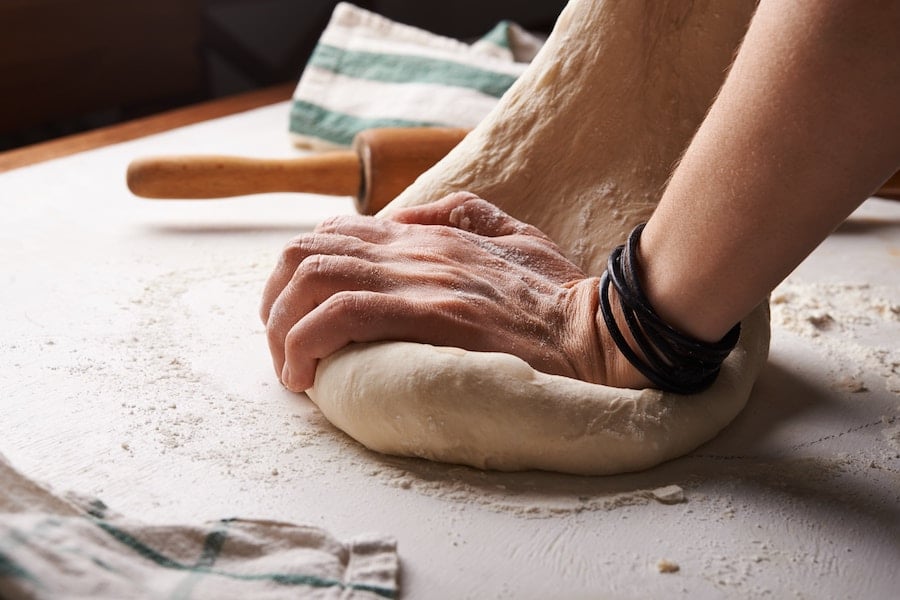
Interestingly, there are some mice trials once again that show a gluten free diet may reduce the incidence of Type 1 diabetes in offspring. It’s super important to remember these are mice trials, so if you don’t have celiac disease, please don’t start cutting out gluten if you’re pregnant. By eliminating certain foods without carefully planning with a dietitian, you may be going on a diet without realizing (read about dangers of dieting during pregnancy here).
For mamas-to-be with celiac disease, I can confidently say, a gluten free pregnancy carries significant benefits for you and your baby. You’ve probably felt the horrible symptoms of eating gluten if you have celiac disease, but have survived to tell the tale, right? When you’re pregnant, this is when celiac disease can become very, very serious. Studies show that preterm babies and low birth weights are more common in mothers with celiac disease who ate gluten during their pregnancies, and the number of low birth weight babies dropped from 29.4% down to 0% in celiac mothers followed their gluten free diet (and see here). Furthermore, when these mothers went gluten free, their breastfeeding duration increased by 2.38x. Low birth weights and preterm babies are pretty serious, so the Journal of Obstetrics and Gynaecology Canada considers celiac disease pregnancies to be high-risk, and recommends increased monitoring with your healthcare professionals.
Breastfeeding and Introducing Gluten-Containing Foods
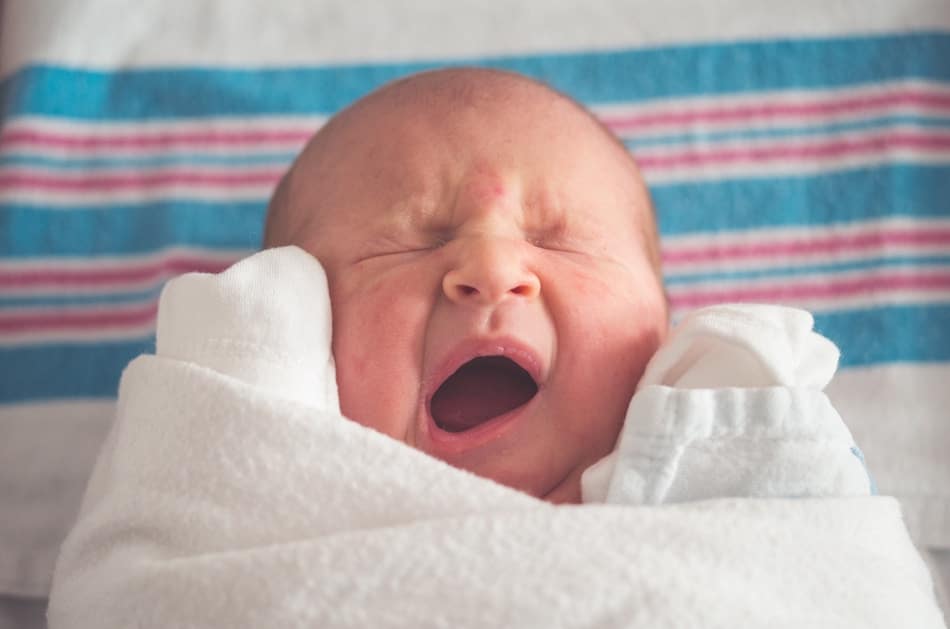
We know introducing peanuts early can reduce the risk of allergy, so you may be wondering if the same goes for gluten. Previous studies suggest that breastfeeding has a protective effect against developing celiac disease. The timing of introducing gluten is also important, as this 2012 review found that babies who were introduced to gluten at 6 months had a lower risk than 4 months, and babies who were introduced large amounts at once later developed celiac disease. We must note that we’re unsure if this “protective effect” persisted throughout their lives, or if the celiac disease diagnosis was just delayed. Most of these studies only covered the first 2 years of the babes’ lives so unclear whether they developed it later.
AND, as with all research, there’s constantly new studies popping up that challenges old conventions. Don’t you just love science? In , there was an update on this topic based on newer, more high-quality evidence, challenging some major beliefs based on the previous review. They found that breastfeeding and the timing of gluten introduction actually have no effect, although they confirmed that consuming large amounts of gluten during introduction did increase the risk. Another team of researchers reviewed the most up-to-date evidence and found the same results.
Other Factors Affecting Celiac Disease in Children
There’s so much research on this disease, with some studies branching into other factors during pregnancy like antibiotics, iron and vitamin D. Let’s jump into it.
Our gut bacteria is all the craze right now. Essentially, it’s the bacteria in the digestive tract that is linked to the immune system and thus many chronic diseases. Its development starts in the pregnancy phase, and antibiotics at this time can influence the microbiota development in the baby. Based on this knowledge, this study investigated whether or not antibiotics affected celiac disease in babies.
Results?
Null. Of the 1836 children exposed to antibiotics during pregnancy, only 12 of them developed celiac disease, hardly enough of an impact to draw an association between antibiotics and celiac disease.
Taking iron supplements (not food) during pregnancy was found to be linked to an increased risk of celiac disease in children (see here). However, if you look into the nitty gritty details of this study, only 4.65 of 1000 children with celiac disease had pregnant mothers on iron supplements, compared to 3.15 of 1000 children with celiac disease whose mothers were not. That makes a difference of 1.5 children….hardly enough to draw conclusions, right? However, this opens up some more interest in research on the potential effects of iron supplementation.
Finally, Vitamin D during pregnancy and celiac disease risk has also gained some attention in the science world. Since Vitamin D in pregnancy and early life is linked to reduced risk of Type 1 diabetes and multiple sclerosis, researchers in Norway were curious to see if this applied to celiac disease. Once again, this results were underwhelming, as their results did not support the idea. Although those with celiac disease need to be more mindful of their Vitamin D intake, since it’s related to their bone health (remember how I said celiac disease is linked to decreased bone mineral density), there is currently no evidence for its role in the pregnancy stage and subsequent celiac disease.
The Verdict on Going Gluten Free During Pregnancy
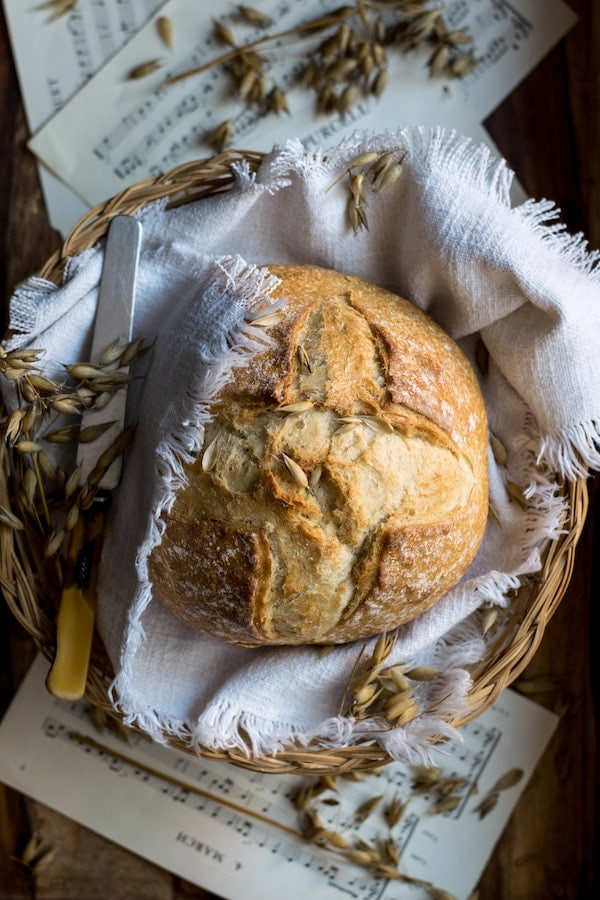
My job is to put on my critical thinking glasses to analyze the current evidence and give you the most informed recommendations. Obviously, if you have celiac disease and are managing it through a gluten free diet, continue to do so with great care – you and your baby’s health need it! As it can be considered a high-risk pregnancy, I’m sure you’ve already been advised by your healthcare practitioner to take extra precaution.
However, if you don’t have celiac disease or gluten-sensitivity, I really don’t suggest you start going gluten free. Unnecessarily cutting out major foods from your diet can put you at a higher risk for malnutrition, which is the exact opposite of what you want during this beautiful phase of growing a babe in you! Trust me, it takes a lot of energy, so the last thing you want to do is put yourself at risk because of some anti-gluten fear-mongering articles you’ve read in the news.

Don’t fear gluten, but know that gluten in itself isn’t necessary for our health. The reason I’m warning you of unnecessarily cutting it out is because it’s usually found in foods that also contain a lot of fiber and other essential vitamins and minerals. Everyone’s bodies are unique, and I’m a big believer that the absolute best diet is whatever eating pattern works for you and gives you pleasure. Everything else is just “good to know” facts, recommendations that you may or may not follow based on what works for your body and lifestyle. Whether this means you enjoy bowl of gluten-filled pasta every day during your pregnancy, or not at all because you simply don’t feel like it, take these research studies in stride. If you’re feeling happy and healthy the way you’re eating right now, why stop?
Become an Abbey’s Kitchen Subscriber
Have you experienced a gluten free pregnancy?
Did you see any benefits?
Leave a comment below!
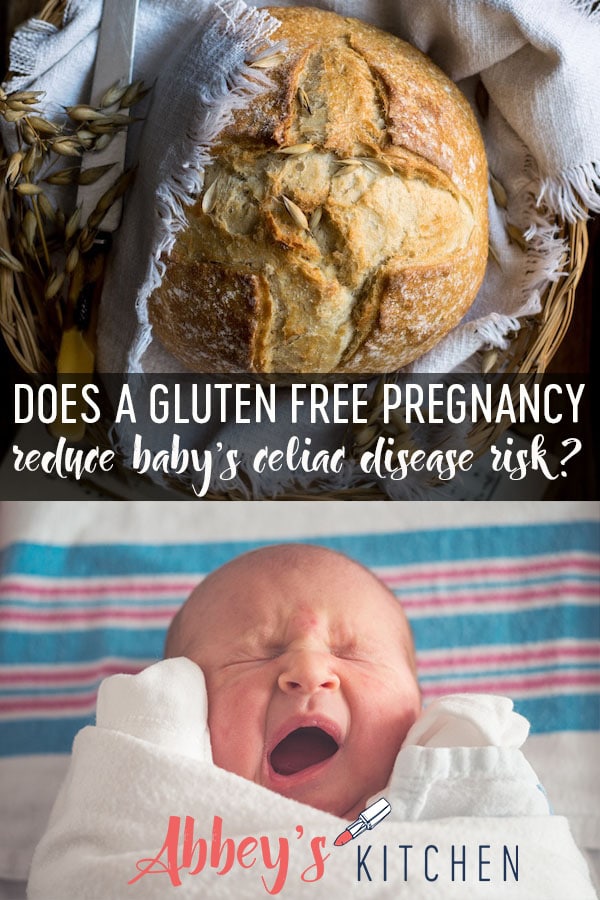
Contribution By:
RD2D Trista Chan
Updated on October 4th, 2021

Abbey Sharp is a Registered Dietitian (RD), regulated by the Ontario College of Dietitians. She is a mom, YouTuber, Blogger, award winning cookbook author, media coach specializing in food and nutrition influencers, and a frequent contributor to national publications like Healthline and on national broadcast TV shows.




Bethany Rutledge says
Interesting topic and hadn’t heard this take before. Thanks for sharing and good to keep in mind if I ever fall pregnant again. 🙂
Abbey Sharp says
Thanks!
Leslie says
You do an excellent job of explaining everything so well and doing your research! This was very helpful!
Abbey Sharp says
aw thank you so much
jill conyers says
Interesting read Abbey. I’m sure we’ll see more research in the near future.
Abbey Sharp says
Yes, definitely! Thanks Jill
Julie @ Running in a Skirt says
So interesting! It’s good to know what you don’t really need to cut gluten unless you actually have a problem.
Abbey Sharp says
YES exactly
Kelly says
This is really interesting. I wasn’t aware of the topic, but glad you spelled it all out. Thanks for all the work!
Abbey Sharp says
Thanks love!
Emily @Sinful Nutrition says
Such an interesting topic, I never even thought of that! Glad you cleared up any confusion!
Abbey Sharp says
Gladly!
Deborah Brooks says
Definitely a huge topic of conversation lately!
Abbey Sharp says
for sure!